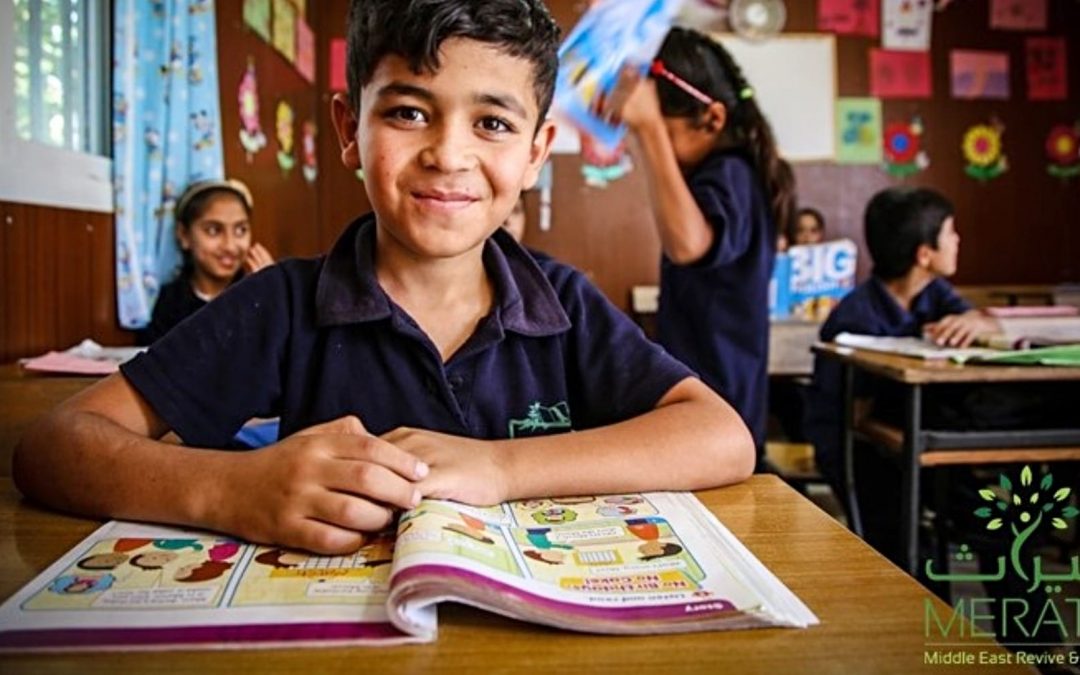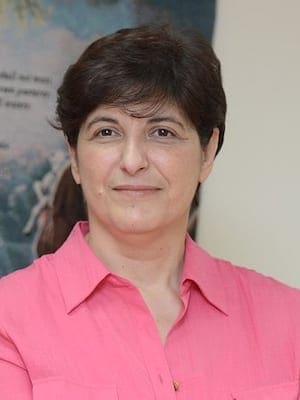His eyes open wide with excitement, you could not miss his joy and deep sense of achievement as 11-year-old Fahd* dragged me by the arm to where he had just written his name on his own – and for the first time.
The expression on his face was similar to the one I saw years back on the face of young Hanan*, assumed deaf from birth, when she first experienced hearing aids.
Both reminded me of how much we take for granted, but also of our responsibility toward others, and the difference we can make when we take our responsibility seriously.
Today, there are 385,000 Syrian refugee children of mandatory school age (6 to 14 years) in Lebanon, of whom 36% are out of learning.
While the number is greater than what our public schools can accommodate, the other reality is that the children are too far behind and vulnerable for the public school system to accommodate.
Fahd is one of over 1,600 vulnerable Syrian refugee children in Lebanon enrolled in the education programs offered at 10 church- and community-based learning centers supported by the Lebanese Society for Educational and Social Development’s (LSESD) relief and development arm, MERATH.
These centers offer focused, relational education, which is exactly what the children need, given their circumstances, and which the public school system cannot provide.
The atrocities of war and displacement have left their impact on these children, many of whom suffer from depression, PTSD, anxiety disorders and developmental problems.
And since LSESD’s approach is a holistic integrated one, LSESD’s SKILD Center comes alongside MERATH offering psychosocial support and life skills for Syrian refugee children at a number of these church-based learning centers.
Education is a basic human right and a main area of focus for LSESD that involves offering quality education opportunities where learning, faith and practice are integrated.
In parallel with Syrian refugee children, SKILD Center serves students with learning difficulties in Lebanon.
SKILD’s journey started in 2011 when it came to our attention that children with special needs are highly marginalized, misunderstood and ill-treated at various levels.
Since then, SKILD Center has been working toward inclusive communities where children with special needs are integrated in public and private schools, but also in churches and the wider community.
Realizing the challenges in our context, we had to work on more than one level, including offering individualized support to children with learning difficulties, working with parents, educators and school administrators, Sunday School and children ministry leaders and workers.
Knowing that changing a culture does not take place overnight but necessitates raising public awareness and education at the national level, we set out to do just so.
This led in April 2013 to the launching of the National Day for Students with Learning Difficulties.
And as part of this national awareness campaign, earlier this year, in February 2019, we partnered with the Tim Tebow Foundation and a number of educational institutions in Lebanon to hold the very first “Night to Shine” event in the Middle East, backed with full media coverage.
Education involves making available quality resources that inform the wider public.
And so SKILD Center set out – in partnership with our publishing house Dar Manhal Al Hayat and educational institutions such as Biola University and Haigazian University – developing and publishing several resources that serve the needs of the community in Lebanon and other parts of the Arab world too.
We went one step further in 2018 and partnered with Edraak, an initiative of the Queen Rania Foundation in Jordan, for the provision of a free online training course titled “Intro to Overcoming Learning Difficulties” led by our SKILD team.
To make a difference, we had to work at different tracks, involving different segments of the community, the media included.
As a result, today we have encouraging real-life stories of children who were destined to drop out of school at an early age and others who would not have been accepted from the start who are now able to continue their studies.
In fact, with them in mind, LSESD just signed a memorandum of understanding with the Notre Dame University – Louaize (NDU) centered around the establishment of a SKILD-NDU representative office on NDU’s main campus serving NDU students – old and new – with special educational needs as well as a SKILD-NDU center offering support for the wider Keserwan community.
Our journey with special needs education started with LSESD’s Beirut Baptist School, a school academy with a student body of around 1,300 (kindergarten to 12th grade), currently including 86 students with learning difficulties and special needs.
So, while SKILD offers individualized support for students with learning difficulties, Beirut Baptist School integrates its special needs students in the classroom.
Earlier this academic year, Beirut Baptist School launched a new two-track SMART program, which now enables the school to cater to learners with autism spectrum disorder, epilepsy and Down syndrome.
Over the years since its initiation in 1957, Beirut Baptist School has earned a reputation for having the best interests of its students in mind.
Steps along the way include receiving accreditation from AdvancEd around 10 years ago and pursuing International Baccalaureate today.
Education is one way LSESD serves the community. Relief and development are others.
Yet, sometimes we meet people who ask: Why get involved? How is serving the community your concern as a Christian organization?
Faces of people and children, like Fahd, come to mind as we explain our understanding of the Gospel as word and deed and share our understanding of just how “as our proclamation has social consequences as we call people to love and repentance in all areas of life; our social involvement has evangelistic consequences as we bear witness to the transforming grace of Jesus Christ” (Micah Global Network).
Editor’s note: The asterisk on children’s names indicates these are pseudonyms to protect their identities. This article is part of a series of articles this week for International Literacy Day (Sept. 8). Previous articles in the series are:
Literacy: Powerful Weapon Against Inequality if We Use It | Hannah Watson
Helping Students Discover the Worlds Awaiting Them in Books | Trevor Barton
Alia Abboud is Director of Development and Partner Relations at the Lebanese Society for Educational and Social Development.


